News Updates
VSPCA Cyclone and Flood Disaster Report: September 19, 2005
Below is Pradeep Nath of the VSPCA's account of the Bengal cyclone that hit Visakhapatnam and surrounding areas these past few days. (Visakha is on the Bay of Bengal which is prone to cyclones, as in the USA hurricane region). The shelter flooded due to unprecedented rainfall as the wall protecting it broke. All the animals are saved but in danger of falling prey to disease. The surrounding areas are also in a state of disaster; and VSPCA must go out once again as it did after the tsunami to help all the animals -- there is no one else. Other animal shelter workers from far away are rushing to help. Lots of help is needed:
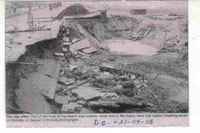
Deccan Chronicle photo: 21 Sept. 2005.
- for emergency food/medicines and help as all food stores were lost;
- for teams to go out to surrounding areas, as VSPCA is the only animal
- welfare organization that can do this;
- and for rebuilding of infrastructure, as many key structures were lost.
All 700 animals were saved; but they and VSPCA staff are in danger of illness. VSPCA will come back better than before with your kind support.
Please read on, but do not lose heart. VSPCA plans to rebuild with special fortifications against future floods. We are not giving up, so please don't give up on us! Our prayers go out to those who are working to help in other disaster areas.
With infinite gratitude for your support, Eileen Weintraub, Seattle, Washington USA
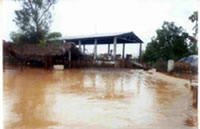
The cow sheds under up to 8 feet of water and now is at 5 feet. Luckily we had this built on a higher platform anticipating these potential problems.
Road on the way to the shelter destroyed. Same as after the tsunami Pradeep laments that the beach submarine survived (this submarine interferes with the yearly Olive Ridley sea turtle nesting which we were just about to send a report out on).
Cattle Give Warnings - the astounding story is on Monday 19th Sept. at 11:30 AM most of the cattle turned restless in all the sheds trying to accommodate each other, 330 in number, crowded together to protect from ceaseless rains. Through all the heavy rain during the past day and a half they were fine but at this hour they began to cry out in despair. Immediately Sarada and Raj (the shelter managers) threw the goshala (cow shelter) gates open and all of them ran out. Exactly one half hour later the west wall gave way and flooding rose to 8 feet. There was already water stagnating in the shelter up to ankle deep due to the continuous rains. Amazing insight of the animal's instincts which we noticed during the tsunami times that cattle can sense natural disasters warning us of danger and warning us to rescue them as well! This made the shelter personnel to rush in and pull out all the puppies from the pound and dogs from nearby storage areas where some take rest. The puppies survived but mostly their pound did not.
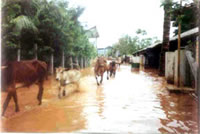
Cattle rushing out by themselves before flood hit.
Above right: the cow sheds under up to 8 feet of water and now is at 5 feet. Luckily we had this built on a higher platform anticipating these potential problems.
Our idyllic shelter now flooded, here the dry hay section areas at the NW point. Water had risen to 9 feet at this stage. Water is now receding.
Due to the heavy water all 50,000 earthworms (developed from 2000) born in the vermicompost pits have died. Their valuable work for nature has come to a tragic end. 50,000 earthworms made the quickest vermicompost of all time, growing plants that helped to feed the animals and teaching surrounding farmers humane methods to keep their cattle from slaughter. We would sell some, use some and encourage area farmers to learn the best organic methods to help animals and nature.
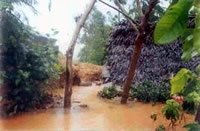
This shows all the water rushing in after the wall breached. With three collapsed huts this is the lone one standing at 11 feet.
More photos to come, thank you all. Sorry they are not close up of the animals but VSPCA doesn't feel its right to take photos of distressed animals. Special thanks are due to Mrs. Maneka Gandhi and Mr. Phil Wollen for convincing officials to come immediately and help us access and hopefully begin the restoration work.
Below report from three officials from Animal Husbandry, Housing Board and Zilla Parishad along The Executive Engineer and other officials. Submitted to the District Collector on the spot the day after the floods:
-- 320 feet boundary wall collapsed from West to North;
-- seven thatched huts from the cattle section including vermicompost and
vehicle section very badly damaged and unusable out of which four washed
away;
-- Feed room with 30 bags destroyed and other materials for cattle usage;
-- Puppy's pound partially destroyed.
-- The temporary drainage system at the cow shelter system is gone;
-- Three wells destroyed one of them totally broken down.
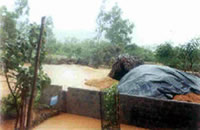
More of the shelter under water; the biogas plant and vermicompost and showing water coming in from the breached small dam and hitting us directly.
Materials lost:
-- 3 tons of the vermicompost and over 50000 earthworms. We were capable to making 1 ton per day with just the 48 beds. All 48 beds washed away;
-- 5 and half tons of dry hay washed away;
-- Kitchen and electricity room flooded. The kitchen has been shifted to the lab room until it is restored.
-- Biogas slurry fully damaged with the meshing thrown away and flooding the slurry with all sand stones.
-- 125 big plants mostly banana meant as raw materials for vermicompost washed away and fallen down
-- the entire stretch along the fallen boundary wall the special plants as fodder for cattle washed away and badly damaged.
-- many fruit trees extensively damaged.
Rain is falling heavily at the shelter area now and we are trying to protect all the animals before rushing out to help in the surrounding areas. Trains and flights into our area are still blocked but we will get through the roads with our vehicles to help four districts.

